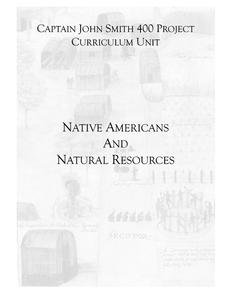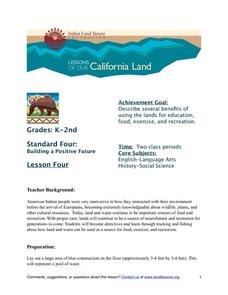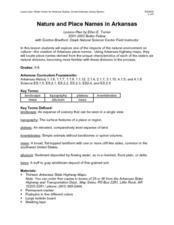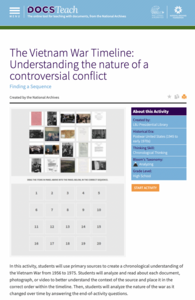Penguin Books
A Teacher's Guide to The Omnivore’s Dilemma: A Natural History of Four Meals by Michael Pollan
"What should we have for dinner?" "What am I eating?" "Where did it come from?" These three questions are at the heart of Michael Pollan's The Omnivore's Dilemma: A Natural History of Four Meals. Pollan's book provides some very...
Howard Hughes Medical Institute
Natural Selection and the Evolution of Darwin's Finches
Darwin explained the connection between species of finches 150 years before scientists understood DNA. Technology and progressing science proved he was right, yet many struggle to understand how natural selection happens. Scholars use...
Curated OER
Native Americans and Natural Resources
North American Indian civilizations had already been in place for over 10,000 years before the arrival of European settlers. Introduce your young historians to Indian tribes that lived in the Chesapeake region in the early seventeenth...
Curated OER
The Effect of Natural Selection on Genes, Traits and Individuals
Rotating through five stations, evolutionary biologists explore the question of how changes in DNA facilitate the changes in a population over time. High-quality, colorful cards of animals, skeletons, skulls, and DNA sequences can all be...
Fluence Learning
Writing About Literature: Nature in the Writings of John Muir and Emily Dickinson
As an assessment of their skill in crafting a compare and contrast essay, class members read and compare the portrayals of nature in excerpts from naturalist John Muir's My First Summer in the Sierra and from poet Emily Dickinson's "The...
Indian Land Tenure Foundation
Gifts from Land and Water
With a series of fun hands-on simulations, young children can learn about conservation and natural resources. Your learners become land detectives, discussing and investigating the gifts that the land and water provide them. They then...
Curated OER
Artificial Selection
The second lesson in the series begins with a starter activity discussing wild versus domesticated animals. Then, scholars play a card game, with optional variations, to emphasize artificial selection. Next, they attend a field trip to a...
National Park Service
The Young Naturalist
Beginning with a brief history of our 26th president, Theodore Roosevelt, then followed by a discussion of his interest in nature, young scientists take to the outdoors to locate and observe local plants and insects. Scholars return to...
Constitutional Rights Foundation
Naturalized Citizens and the Presidency
Article II, Section 1 of the U.S. Constitution takes center stage in a lesson that asks class members to assume the role of state senators, debate a resolution to amend the U. S. Constitution to permit naturalized citizens to run for...
Howard Hughes Medical Institute
The Making of the Fittest: Got Lactase? The Co-evolution of Genes and Culture
Got milk? Only two cultures have had it long enough to develop the tolerance of lactose as an adult. Learn how the responsible genes evolved along with the cultures that have been consuming milk. This rich film is supplied with a few...
Center Science Education
Paleoclimates and Pollen
Demonstrate for your earth scientists how plant pollen of the past has become part of sedimentary deposits, providing clues about ancient climates. Then give them simulated sediment layer samples to analyze for different types of paper...
Curated OER
N is for Natural State
For any pupils who live in the state of Arkansas, this would be a fabulous educational experience to help them get to know their state better. Through the use of activities in literature, art, mathematics, science, social studies, and...
Curated OER
Lesson: After Nature: Visions and Visionaries
Build visual literacy, discussion, and critical thinking skills with an innovative art instructional activity. Young analysts discuss the use of decalcomania, surrealism, and automatism in various contemporary pieces, discuss constructed...
Curated OER
Nature and Place Names in Arkansas
Middle schoolers examine the way that many place names in Arkansas came to be. By looking at Arkansas highway maps, they find names that come from the characteristics of each of the state's six geographical divisions. This interesting...
Curated OER
Lesson: Tlatelolco: Mexican Student Massacre 1968
The Massacre of Tlatelolco is the focus of a discussion-based lesson plan. Civil-minded learners consider the nature of student movements that have ended in violence based on over-reaction and government oppression. They discuss the...
K-State Research and Extensions
You Ol’ Fossil
Geologists are gneiss, tuff, and a little bit wacke. The fifth chapter of seven includes ten activities at four different levels. The hands-on activities cover fossils including how they are formed, vertebrates, invertebrates,...
Alabama Wildlife Federation
Wildlife Habitat Checklist
Take a walk on the wild side with a project about animal habitats. After kids observe a chosen animal in its home, they describe the animal's food and water sources, shelter, and how it raises its young. They then write a short fictional...
Curated OER
Importance and History of Ecological Conservation
Discuss and analyze a variety of information regarding the history of ecological conservation and preservation, as well as its importance. Scholars work in groups to complete four different activities, then report back to the class for a...
American Institute of Physics
Dr. Gates and the Nature of the Universe
What do Russian nesting dolls have to do with physics? They make a great demonstration tool for explaining Dr. Sylvester James Gates, Jr.'s string theory to young scientists. A two-part lesson first introduces learners to Dr. Gates' life...
Atlanta History Center
Civil Disobedience and the Atlanta Student Movement
What tactics are used in civil disobedience? Learners study the conditions in Alabama that led to the establishment of the Atlanta Student Movement, as well as consider the nature and effectiveness of civil disobedience.
Channel Islands Film
Lone Woman of San Nicolas Island: Lesson Plan 4
Imagine being stranded all alone on an island for 18 years. How would you survive? Class members are challenged to makes necessities out of natural materials that would likely be found on an island.
DocsTeach
The Vietnam War Timeline: Understanding the Nature of a Controversial Conflict
The story of the Vietnam War is often told through images. Young historians analyze images and primary sources —including the Vietnamese Army's Seven Commandments poster and photos of the daily life of soldiers—to construct a timeline of...
Curated OER
A River Ran Wild: An Environmental History
The Nashua River serves as the focal point of an investigation of the treatment of and care for natural resources. A reading of A River Rand Wild: An Environmental History by Lynne Cherry, launches the study and class members consider...
Curated OER
Step Into the Past: Change and Growth in Arkansas
The concept of change over time is presented in this history lesson. In it, learners discuss how some things stay the same over time, while other things change. Teams of learners research and create a timeline of important events that...
Other popular searches
- Museum of Natural History
- Australia Natural History
- Natural History Writers
- Natural History of Hawaii
- Natural History Museums
- Australian Natural History
- Natural History Yosemite
- Ancient Natural World

























